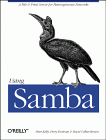

|
Using SambaRobert Eckstein, David Collier-Brown, Peter Kelly1st Edition November 1999 1-56592-449-5, Order Number: 4495 416 pages, $34.95 |
8.5 Recently Added Options
Samba has several options that appeared around the time of Samba 2.0, but either were not entirely supported or were in the process of being developed. With Samba 2.0.7, several more were introduced. We will give you a brief overview of their workings in this section. These options are shown in Table 8.9.
Table 8.9: Recently Added Options Option
Parameters
Function
Default
Scope
change notify timeoutnumerical (number of seconds)
Sets the interval between checks when a client asks to wait for a change in a specified directory.
60Global
machine password timeoutnumerical (number of seconds)
Sets the renewal interval for NT domain machine passwords.
604,800(1 week)Global
stat cacheboolean
If
yes, Samba will cache recent name mappings.
yesGlobal
stat cache sizenumerical
Sets the size of the stat cache.
50Global
utmpboolean
Turns on logging of Samba users in the utmp file. Requires --with-utmp.
noShare
utmp dirstring (pathname)
Sets the directory where Samba expects to find the utmp/utmpx file.
NoneShare
inherit permissionsboolean
Sets the permissions of newly created directories to the same as their parent.
noShare
write cache sizenumerical (bytes)
Sets the size of a write cache (buffer) used for oplocked files.
0Share
source environmentstring (pathname)
Sets a file to read environment variable from.
NoneGlobal
min password lengthnumerical (number of characters)
Sets the minimum length of a new password which Samba will try to update the password file with .
5Global
netbios scopestring
Sets the NetBIOS scope.
NoneGlobal
8.5.1 change notify timeout
The
changenotifytimeoutglobal option emulates a Windows NT SMB feature called change notification. This allows a client to request that a Windows NT server periodically monitor a specific directory on a share for any changes. If any changes occur, the server will notify the client.As of version 2.0, Samba will perform this function for its clients. However, performing these checks too often can slow the server down considerably. This option sets the time period that Samba should wait between such checks. The default is one minute (60 seconds); however, you can use this option to specify an alternate time that Samba should wait between performing checks:
[global] change notify timeout = 308.5.2 machine password timeout
The
machinepasswordtimeoutglobal option sets a retention period for NT domain machine passwords. The default is currently set to the same time period that Windows NT 4.0 uses: 604,800 seconds (one week). Samba will periodically attempt to change the machine account password, which is a password used specifically by another server to report changes to it. This option specifies the number of seconds that Samba should wait before attempting to change that password. The following example changes it to a single day, by specifying the following:[global] machine password timeout = 864008.5.3 stat cache
The
statcacheglobal option turns on caching of recent case-insensitive name mappings. The default isyes. The Samba team recommends that you never change this parameter.8.5.4 stat cache size
The
===statcachesizeglobal option sets the size of the cache entries to be used for thestatcacheoption. The default here is 50. Again, the Samba team recommends that you never change this parameter.8.5.5 utmp
If you specified
--with-utmpwhen configuring, this option will turn on utmp logging of users: they will appear in the utmp file and you will be able to see if they are on with last(1). It defaults tono.8.5.6 utmp dir
If
utmpis set, the utmp dir option will change the directory Samba looks in for the utmp files. If it is not set, the default system location will be used.8.5.7 inherit permissions
This option causes new files and directories to be created with the same permissions as the directory they're in. For example, subdirectories will inherit setgid bits from their parents. This option will override the
create mask, directory mask, force create modeandforce directory modeoptions, but not themap archive, map hiddenandmap systemoptions. It will never set thesetuidbit. This option defaults to off.8.5.8 write cache size
The
write cache sizeshare option sets the size of a cache used by Samba while writing oplocked files. The files will be written in cachesize blocks, so you can tune Samba's write size to the optimum size for your filesystem or RAID disk array.The caching applies to the first 10 files opened with oplocks if set, and defaults to zero (off) initially.
As with all caching schemes, data that hasn't been written will be lost if the system crashes.
8.5.9 source environment
This options specifies a file of environment variables that Samba will read on startup. The variables set in this files can then be used in smb.conf files as $%name. For example, HOME=/home/sofia in the environment file could be used in a smb.conf file as "path = "$HOME"
If the pathname begins with a "|" (pipe) symbol, Samba will attempt to run it and read its standard output.
8.5.10 min password length
This option sets the minimum length, in characters, of a plain text password that Samba will accept when performing UNIX password changing. This is used to tell Samba about system-defined minimums, so it can return an appropriate error to the client.
8.5.11 netbios scope
This sets the NetBIOS scope that Samba will operate under: Samba will not communicate with any machine with a different scope. This should not be set unless every machine on your LAN also sets this value. It was a predecessor to workgroups, and the Samba team recommends against using it.
8.4 WinPopup Messages 8.6 Miscellaneous Options O'Reilly Home | O'Reilly Bookstores | How to Order | O'Reilly Contacts
International | About O'Reilly | Affiliated Companies© 1999, O'Reilly & Associates, Inc.



